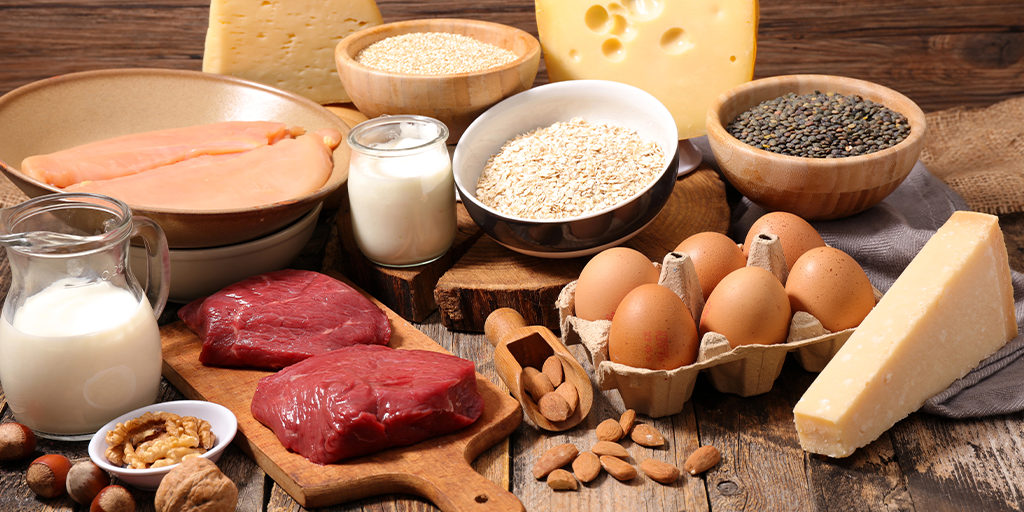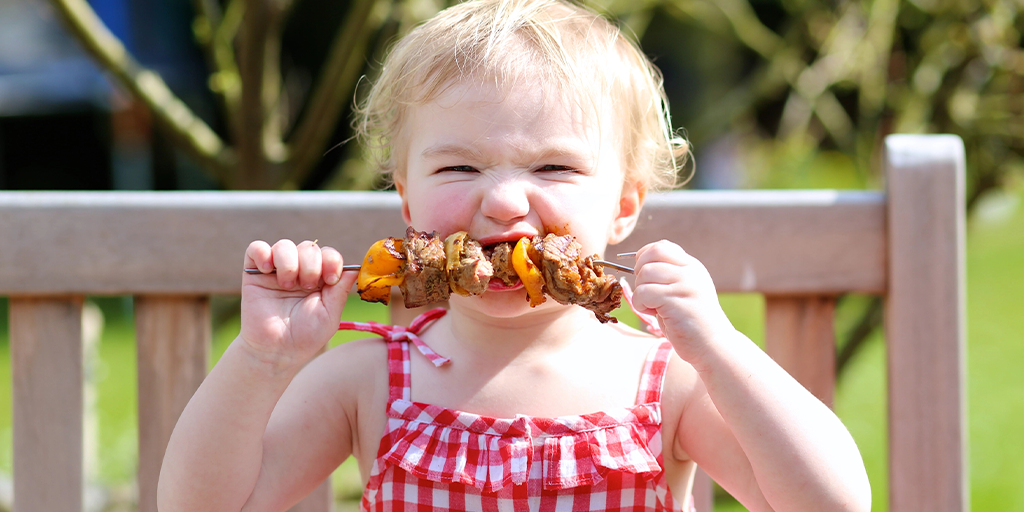As parents, we all strive to provide our kiddos with the nutrients they need to thrive, and protein is a crucial part of that puzzle. Protein is a key player in your toddler’s health, from building strong muscles to supporting a healthy immune system. But with so much information out there (Google: A blessing and a curse), it can be tough to sift through what’s important. We’ve put together this guide—packed with practical tips, easy recipes, and expert advice—to help you confidently navigate your toddler’s nutritional needs.
So, whether you’re introducing solids to your adventurous eater or looking for ways to balance a vegetarian diet, let’s explore how to make protein a healthy, delicious part of your child’s everyday meals.
What Is a Protein and Why Does Your Toddler Need It?
Protein isn’t just a health buzzword—it’s a fundamental building block for the human body, vital for your little mover and shaker. Protein helps build muscles, supports the immune system, and repairs tissues. For toddlers, who are growing and changing every day (at least that’s how it feels), getting enough protein is especially important to support their rapid development.

The ABCs of Proteins: Complete vs. Incomplete
Not all proteins are created equal. They’re divided into two main categories: complete and incomplete.
- Complete Proteins: These contain all nine essential amino acids our bodies can’t produce independently. Think of amino acids as the letters of the alphabet needed to make words (proteins) that our body understands and uses. Animal sources, like beef, fish, poultry, eggs, and dairy, are packed with complete proteins, making them one of the nutritionally dense parts of your child’s diet.
- Incomplete Proteins: Typically found in plant sources like beans, nuts, and whole grains, they lack one or more essential amino acids. But don’t worry! You can combine plant-based proteins, like rice and beans, to make a complete protein. For example, pairing peanut butter with whole-grain bread creates a nutritious, complete protein meal for your child.
How Much Protein Does Your Toddler Really Need?
While adults might casually track their protein intake, the stakes are higher for toddlers because they’re in a critical phase of growth and development. Generally, toddlers need about 13 grams of protein daily, but it can vary. The rule of thumb is about 1.1 grams of protein per kilogram of body weight. For a more personalized assessment, consider your toddler’s age, size, and how active they are:
- 1-3 years old: About 13 grams of protein daily is sufficient.
- 4-8 years old: As they grow, his or her protein needs increase slightly, up to about 19 grams daily.
Even more confused? There’s reason to relax: The American Academy of Pediatrics (AAP) recommends that toddlers from one to three eat just two servings of protein every day (about one ounce of meat or a quarter-cup of beans). And if your toddler is drinking 16-24 ounces of cow’s milk daily, they’re likely getting all the protein they need.

Protein Sources for Your Busy Toddler
Protein comes in many shapes and sizes, and finding the right sources for your toddler can be a fun and adventurous way to expand their tastes early on. Whether your family follows a traditional diet, is vegetarian, or is somewhere in between, there are plenty of protein options to keep your little one healthy and happy.
Animal-Based Proteins: More Than Just Chicken Nuggets
It’s easy to fall into the chicken nugget trap, but there are so many other delicious and nutritious animal-based proteins to offer your toddler:
- Fish: Not only is fish a fantastic source of protein, but fatty types like salmon are also rich in omega-3 fatty acids, essential for brain development. Early introduction of fish can help develop a taste for its unique flavor—just make sure it’s properly deboned and cooked to a safe temperature.
- Turkey: A lean and versatile protein, turkey can be an excellent alternative to heavier meats. It’s perfect in everything from meatballs to simple turkey slices, which can be a snack-time hero.
- Eggs: Packed with protein and other brain-boosting nutrients, eggs can be scrambled, made into omelets, or baked into muffin-tin frittatas with some veggies for color and extra fiber.
- Dairy Products: Yogurt and cheese are protein-rich and provide calcium for growing bones. Opt for full-fat versions to give your toddler the energy they need. Yogurt can also be mixed with fruits for a delicious breakfast or snack.
Plant-Based Proteins
For families that prefer plant-based sources or just looking to mix things up, there are plenty of protein options that are both safe and nutritious:
- Beans and Lentils: These are high in protein and fiber, which can help keep your toddler’s digestion regular. Mash them into patties, stir them into soups, or mix them with rice.
- Tofu: A staple in vegetarian diets, tofu is wonderfully (strangely?!) absorbent. It takes on the flavors of whatever it’s cooked with, making it a great protein to experiment with in all your family’s favorite dishes.
- Smooth Nut Butters: Nut butters are a hit with most toddlers and a good source of protein. Spread almond or peanut butter thinly on toast or blend into smoothies. Just make sure to choose smooth versions to avoid choking hazards and be mindful of allergies.
Variety Is the Spice of Life—and Nutrition
Incorporating a variety of these foods keeps meals interesting and ensures your toddler gets a rich mix of essential amino acids and other nutrients. Every meal doesn’t need to be perfectly balanced—we’re only human—but try to offer a range of these protein sources over a week. It’ll help cover the nutritional bases and encourage your toddler to be a flexible, adventurous eater.
Finding the Right Mix for Your Toddler
When it comes to feeding your toddler, balance is key. Just like a garden needs the right mix of sun, water, and soil to flourish, your little one needs a balanced diet that includes protein, fats, and carbohydrates to grow healthy and strong.
Protein is critical for building muscles and repairing tissues. But fats are equally important, especially for toddlers, because they support brain development and give your child energy. Healthy sources include avocados, nuts (in butter form to prevent choking), seeds, and oils like olive and coconut.
And who could forget carbohydrates (our favorite food group)? Carbs provide the energy your active toddler needs to play and explore. Whole grains, fruits, and vegetables are excellent sources of carbs and are jam-packed with vitamins, minerals, and fiber.
Can Your Toddler Eat Too Much Protein?
While protein is vital to your kiddo’s development, having too much of a good thing is possible—though unlikely. It’s important not to overemphasize protein at the expense of the other essential nutrients. A diet with excessive protein consumption can burden your toddler’s kidneys and cause them to miss out on the benefits of different food groups.
Aiming for a varied diet over the course of a day or a week can help ensure that your toddler receives the right mix of all essential nutrients. Don’t stress about achieving perfect balance at every meal. Instead, focus on providing a variety of foods. For instance, if breakfast was rich in carbohydrates, make lunch a little more protein-focused with some added energy-feeding fats.
Vegetarian and Vegan Diets: Plant-Powered Protein
Raising your toddler on a vegetarian or vegan diet can be a healthful choice—you do what’s right for your family. Still, careful planning is required to ensure they get all the necessary nutrients, especially protein. These are some considerations to keep in mind:
- Getting Enough Protein: Plant-based proteins are fantastic and varied. Experiment with lentils, chickpeas, tofu, tempeh, and quinoa in your toddler’s meals. We love mixed fruit and nut trail mix for quick, mess-free snacks (they’re also vegan-friendly).
- Combining Proteins: Remember, not all plant proteins are complete, so you’ll need to combine different protein sources during different meals to ensure they’re getting all essential amino acids. Rice and beans, peanut butter on whole grain bread, or hummus with whole wheat pita are all great combinations that kids love.
- Supplements and Fortified Foods: Sometimes, supplements like vitamin B12 (naturally found in animal products) might be necessary, especially in vegan diets. Fortified foods can also help bridge any nutritional gaps. Always discuss these options with a pediatrician or nutritionist experienced with vegetarian and vegan diets.
What About Food Allergies?
Food allergies can make protein sourcing more challenging, especially if common proteins like dairy, eggs, or nuts are off the table.
Dairy Allergies: If your toddler can’t have dairy, look for protein-rich alternatives like soy milk and soy yogurt, which are often fortified with calcium and other nutrients. Other non-dairy milk, like almond or rice, may have less protein, so it’s good to check labels and choose the best options.
Nut and Egg Allergies: With nuts and eggs ruled out, turn to seeds (like sunflower or pumpkin seeds) and their butters, which can be great in smoothies or on safe breads or crackers. Legumes, peas, and soy products like edamame and tofu are also excellent sources of protein.
No matter your toddler’s dietary restrictions, it’s important to work closely with a healthcare provider. They can help you navigate the challenges of balancing a restrictive diet and ensure your child isn’t missing out on crucial nutrients. A pediatric dietitian can be a fantastic resource, providing tailored advice and peace of mind.
Even with dietary restrictions, there are countless ways to make meals exciting and nutritious. Use spices and herbs to add flavor without incorporating allergens, and explore international cuisines that align with your child’s dietary needs. Always be open to new foods—you might discover your toddler’s next favorite dish!

Creative Protein-Rich Recipes for Toddlers
Cooking for toddlers doesn’t have to be a big production. Simple, quick recipes enriched with protein can be your BFF during meal prep, ensuring your little one gets the nutrients they need without spending hours in the kitchen.
Protein-Packed Snacks and Meals
- Mini Meatballs: These can be made with ground turkey, chicken, beef, and even mashed beans or lentils for a plant-based option. Infuse them with grated veggies for an extra nutritional punch and serve with a yogurt dip or tomato sauce for dipping.
- Smoothie Bowls: Blend Greek yogurt with fruits like bananas and berries and a spoonful of nut butter for a tasty protein boost. Top with a sprinkle of chia seeds or hemp seeds for texture and added nutrients.
- Egg Muffins: Whisk eggs and pour them into a muffin tin, adding diced vegetables and cheese. Bake until set for a handy, protein-rich snack that’s also great on the go.
- Cheese and Veggie Quesadillas: Use whole-wheat tortillas, add cheese, and finely chop veggies. Cook on a skillet until the cheese melts and the tortilla is toasty. Cut into manageable wedges for pint-sized hands.
Making Protein Foods Toddler-Friendly
Toddlers are often more sensitive to textures and flavors, and introducing protein shouldn’t feel like a chore to them—or to you! Here are some ways to make protein-rich foods more appealing:
- Soften the Texture: Young toddlers might find overly chewy or tough textures off-putting. Make sure meats are cooked until tender, beans are thoroughly mashed, and vegetables are steamed or roasted to softness to make chewing easier.
- Mild Flavors: Start with mild flavors before introducing stronger ones. For instance, mild cheeses and lightly seasoned chicken are usually more toddler-friendly than pungent or spicy options.
- Fun Shapes and Sizes: Use cookie cutters to create fun shapes from pancakes or sandwiches, making the eating experience fun and visually appealing. Even a simple change in presentation can make the same old dish seem new and exciting.
One of the best ways to get your toddler interested in new foods, especially protein-rich ones, is to involve them in the cooking process. Let them help with safe tasks like rinsing fruits and veggies, adding ingredients to bowls, and stirring mixtures. Shared meal prep will excite them to try the foods they’ve helped create and help develop valuable life skills.
Protein has a significant role in your little one’s health, from building strong muscles to supporting a robust immune system. However, balancing protein with healthy fats and carbohydrates is important to ensure a well-rounded diet.
We encourage you to explore the diverse sources of protein that are available. Whether you’re introducing your toddler to the creamy textures of Greek yogurt, the subtle flavors of turkey and fish, or the earthy notes of beans and lentils, there’s a vast world of nutritious and delicious options out there. Each food brings unique flavors and an array of essential nutrients that contribute to your child’s dietary needs.
Finding What’s Right for You
Albee Baby is the oldest family-owned specialty baby shop in the US. We pride ourselves on providing our customers with the best assortment of baby products anywhere, at fair prices, always. We’re committed to being an inclusive resource for parents and hope you feel empowered to find the right baby gear for your family. Still have questions? Feel free to contact our baby gear experts at 877.692.5233 or [email protected].

